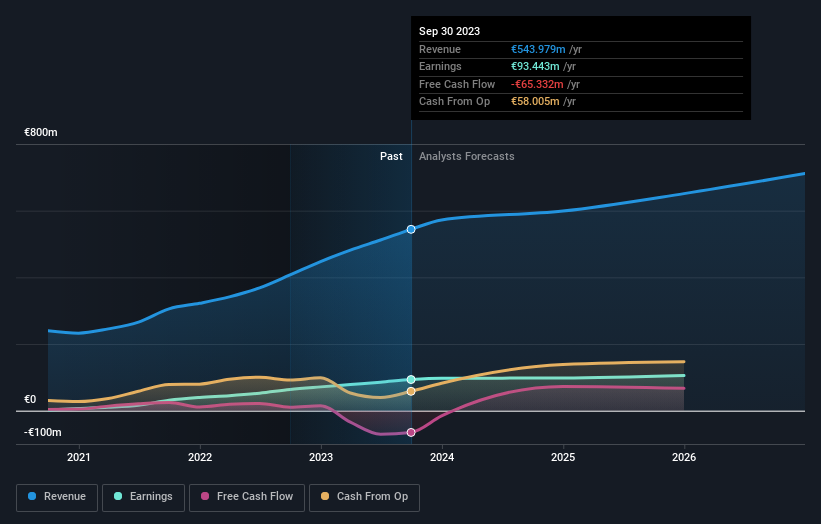- Germany
- /
- Semiconductors
- /
- XTRA:ELG
Elmos Semiconductor SE (ETR:ELG) surges 5.3%; retail investors who own 53% shares profited along with insiders

Key Insights
- The considerable ownership by retail investors in Elmos Semiconductor indicates that they collectively have a greater say in management and business strategy
- A total of 25 investors have a majority stake in the company with 44% ownership
- Insiders own 27% of Elmos Semiconductor
Every investor in Elmos Semiconductor SE (ETR:ELG) should be aware of the most powerful shareholder groups. We can see that retail investors own the lion's share in the company with 53% ownership. In other words, the group stands to gain the most (or lose the most) from their investment into the company.
While retail investors were the group that benefitted the most from last week’s €63m market cap gain, insiders too had a 27% share in those profits.
Let's take a closer look to see what the different types of shareholders can tell us about Elmos Semiconductor.
View our latest analysis for Elmos Semiconductor

What Does The Institutional Ownership Tell Us About Elmos Semiconductor?
Institutions typically measure themselves against a benchmark when reporting to their own investors, so they often become more enthusiastic about a stock once it's included in a major index. We would expect most companies to have some institutions on the register, especially if they are growing.
As you can see, institutional investors have a fair amount of stake in Elmos Semiconductor. This suggests some credibility amongst professional investors. But we can't rely on that fact alone since institutions make bad investments sometimes, just like everyone does. When multiple institutions own a stock, there's always a risk that they are in a 'crowded trade'. When such a trade goes wrong, multiple parties may compete to sell stock fast. This risk is higher in a company without a history of growth. You can see Elmos Semiconductor's historic earnings and revenue below, but keep in mind there's always more to the story.

We note that hedge funds don't have a meaningful investment in Elmos Semiconductor. Because actions speak louder than words, we consider it a good sign when insiders own a significant stake in a company. In Elmos Semiconductor's case, its Top Key Executive, Klaus Weyer, is the largest shareholder, holding 26% of shares outstanding. In comparison, the second and third largest shareholders hold about 5.3% and 1.8% of the stock.
On studying our ownership data, we found that 25 of the top shareholders collectively own less than 50% of the share register, implying that no single individual has a majority interest.
While studying institutional ownership for a company can add value to your research, it is also a good practice to research analyst recommendations to get a deeper understand of a stock's expected performance. There are a reasonable number of analysts covering the stock, so it might be useful to find out their aggregate view on the future.
Insider Ownership Of Elmos Semiconductor
While the precise definition of an insider can be subjective, almost everyone considers board members to be insiders. The company management answer to the board and the latter should represent the interests of shareholders. Notably, sometimes top-level managers are on the board themselves.
Insider ownership is positive when it signals leadership are thinking like the true owners of the company. However, high insider ownership can also give immense power to a small group within the company. This can be negative in some circumstances.
Our most recent data indicates that insiders own a reasonable proportion of Elmos Semiconductor SE. It is very interesting to see that insiders have a meaningful €339m stake in this €1.3b business. Most would say this shows a good degree of alignment with shareholders, especially in a company of this size. You can click here to see if those insiders have been buying or selling.
General Public Ownership
The general public -- including retail investors -- own 53% of Elmos Semiconductor. With this amount of ownership, retail investors can collectively play a role in decisions that affect shareholder returns, such as dividend policies and the appointment of directors. They can also exercise the power to vote on acquisitions or mergers that may not improve profitability.
Next Steps:
It's always worth thinking about the different groups who own shares in a company. But to understand Elmos Semiconductor better, we need to consider many other factors. To that end, you should be aware of the 1 warning sign we've spotted with Elmos Semiconductor .
If you are like me, you may want to think about whether this company will grow or shrink. Luckily, you can check this free report showing analyst forecasts for its future.
NB: Figures in this article are calculated using data from the last twelve months, which refer to the 12-month period ending on the last date of the month the financial statement is dated. This may not be consistent with full year annual report figures.
Valuation is complex, but we're here to simplify it.
Discover if Elmos Semiconductor might be undervalued or overvalued with our detailed analysis, featuring fair value estimates, potential risks, dividends, insider trades, and its financial condition.
Access Free AnalysisHave feedback on this article? Concerned about the content? Get in touch with us directly. Alternatively, email editorial-team (at) simplywallst.com.
This article by Simply Wall St is general in nature. We provide commentary based on historical data and analyst forecasts only using an unbiased methodology and our articles are not intended to be financial advice. It does not constitute a recommendation to buy or sell any stock, and does not take account of your objectives, or your financial situation. We aim to bring you long-term focused analysis driven by fundamental data. Note that our analysis may not factor in the latest price-sensitive company announcements or qualitative material. Simply Wall St has no position in any stocks mentioned.
About XTRA:ELG
Elmos Semiconductor
Develops, manufactures, and distributes microelectronic components and system parts, and technological devices for automotive industry in Germany, other European Union countries, the Americas, Asia/Pacific, and internationally.
Excellent balance sheet with proven track record.

